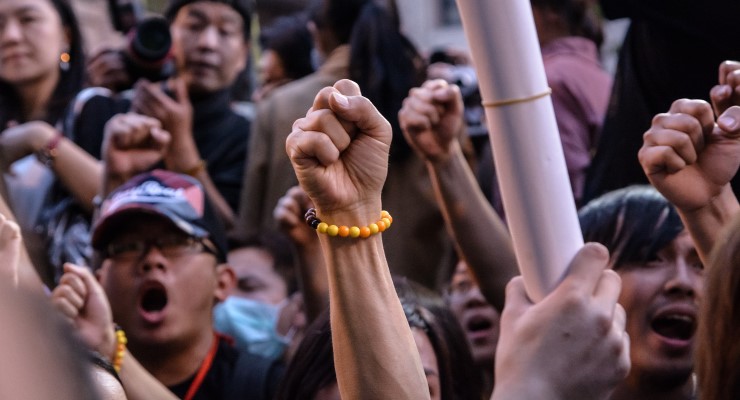
This month, revered Taiwanese independence activist Su Beng passed away aged 101, leaving behind a country at a fragile point in history amid regional unrest triggered by Beijing’s growing control.
The number of countries that officially recognise Taiwan has dwindled to about two dozen as China continues to methodically strip away its allies. The Pacific nations of the Solomon Islands and Kiribati are the latest to jump ship, lured by Chinese economic blandishments.
“For years, Taiwan’s attitude towards its diplomatic allies has been one of sincere friendship. We spare no effort in consolidating our diplomatic relationships, and we treat our allies with sincerity,” the Taiwanese government said in a statement. “However, in the face of China’s interference and suppression, we will not stand to be threatened, nor will we be subjected to ceaseless demands.”
Taiwan’s quinquennial presidential and legislative elections are due to be held in January next year. Fear of Beijing’s expanding control — which has triggered months of ongoing protests in Hong Kong — has seen President Tsai Ing-wen make a remarkable recovery from poor polling numbers to being the election’s front-runner.
The Chinese Communist Party continues to see Taiwan as an errant province, despite never having had any control over the island. Japan was the first country to colonise Taiwan completely — prior to this, the Qing and Ming dynasty forces, the Spanish and the Dutch had all colonised parts of the island.
China has used its heft to exclude Taiwan from global organisations such as the United Nations, getting leaders to sign up to its One-China Policy which acknowledges the People’s Republic of China, rather than the Republic of China (as Taiwan is officially known), as the true sovereign state of China. Many other nations, including Australia and the US, acknowledge that China sees things this way and only give the PRC official diplomatic recognition. The US backs Taiwan militarily, recently inking a deal for more arms sales.
In February 2019, Chinese leader Xi Jinping laid out his vision of the “one country, two systems” principle to include Taiwan, but Taiwan is having none of it. The events in Hong Kong are only hardening its resolve.
“It’s the people who initiated the [Hong Kong] extradition bill who are making trouble, and Beijing’s actions to force Taiwan to accept the one country, two systems framework are the ultimate cause of the disruption of peace across the Taiwan Strait,” said Taiwan’s Mainland Affairs Council — its primary mechanism for dealing with the People’s Republic of China.
The PRC narrative of Taiwan as a “shunned” nation is different from the actual state of affairs. Since introducing democracy in 1996 after a 10-year pre-democracy process, Taiwan has continued to prosper far more quickly than China — becoming one of the four “Asian Tiger” economy.
Largely unheralded, President Tsai has been a force for positive reform in Taiwan, building a generous public sector and passing legislation that made Taiwan the first country in Asia to allow same-sex marriage.
Tsai has also made moves to make the country less economically dependent on China, something from which Australia can learn. She has launched Taiwan’s New Southbound Policy, a comprehensive plan to boost ties with Australia, Southeast Asia, Southern Asia and New Zealand. Taiwan is now Australia’s eighth-highest trading partner.
Fear of further backlash from Taiwan is widely seen as a key reason Xi has not moved more firmly on Hong Kong — but the current, chaotic state of affairs cannot continue forever. Many see the upcoming 70th anniversary of the CCP’s victory in the civil war as a key date for movement in the region. Taiwan stands as unresolved business for the CCP and remains the regions most potent flashpoint. For this reason alone Australia should be paying very close attention.
It stands to be seen whether everything Su fought for will be in vain.








If they’re not prepared to declare themselves to be an independant nation then what do they expect? Mainland China clearly belongs to the winners of the civil war.
Hong Kong is not in anything like the same position as Taiwan. Like a Portugese tart, HK was sold off by Thatcher to Dengs China. I don’t remember Taiwan putting in a bid.
If Taiwan declared itself an independent nation, the PRC would be down on them like a ton of bricks. They probably prefer to survive in the current uneasy stalemate rather than be annihilated.
Naive question warning:
Does Taipei still claim to be the legitimate government of mainland China?
If the de facto reality is that Beijing governs the mainland and Taipei governs the island of Taiwan, is there any reason (other than diplomatic considerations) why other nations can’t officially recognise both governments as the legitimate governments of the territory they each control (but not their claims on each other)?
Yes they do, including HK. And they also claim the “disputed” islands that we are lately wetting ourselves over. Not sure about Tibet.
The Republic of China is, in the legal fiction of its constitution, the legitimate government of all of China. The reason why other countries cannot recognise both authorities within their de facto areas of power is that neither side will tolerate that. The defacto solution is that countries that have relations with Taipei call their representative offices something else: the Australian Office in Taipei, The American Institute etc, and staff them with diplomats. Even China’s Special Administrative Regions, Hong Kong and Macao, exchange “unofficial” representatives with Taipei. Taipei in return has diplomats in “Taipei Cultural and Trade Offices” in many capitals.